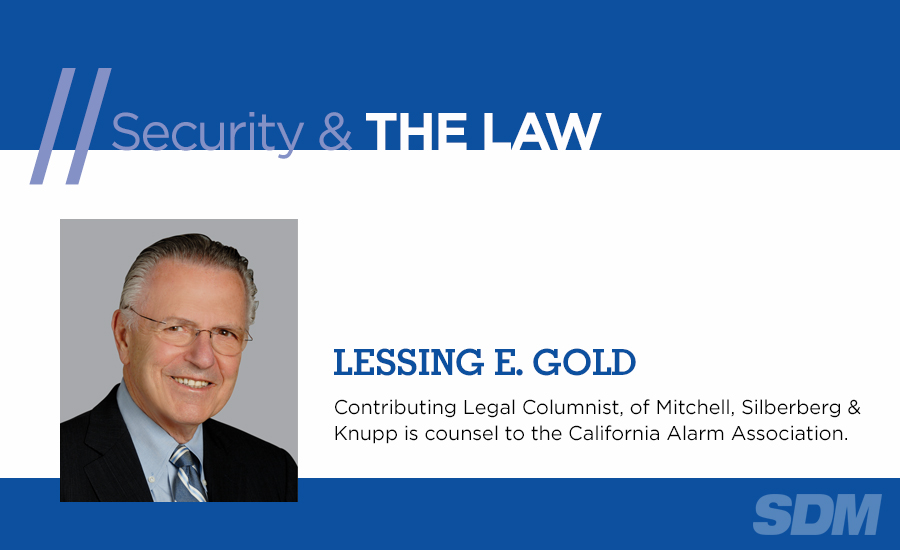Security & The Law
Can Insurance Company Recoup in Fire Sprinkler Case?

In a recent New Jersey case, an insurance company appealed a trial court’s order of summary judgment that dismissed its subrogation claim against the defendant, the installer of the fire sprinkler at the premises. A pipe burst in the plaintiff’s insured facility and caused roughly $1.5 million in property damages. The plaintiff paid the claim in full, obtained an assignment of the insured facility’s rights and brought the subrogation claim against the defendant to recoup the indemnity payments.
The trial court granted summary judgment to the defendant based on a waiver-of-subrogation clause in the contract for services between the plaintiff’s insured facility and the defendant. The trial court also found that a limitation-of-liability provision in the contract, which limited recovery against the defendant to $1,000, was enforceable; and although the contract was adhesive in nature, it was not substantially unconscionable.
In discussing the case, the appellate court referred to the contract signed by the plaintiff’s insured and the defendants, which required the plaintiff’s insured to maintain an insurance policy on the property and to indemnify the defendant for all losses arising from claims required to be covered by the insurance policy.
The contract said the defendant is not an insurer and that the purchaser agrees that neither the defendant nor its subcontractors or assignees are insurers and no insurance coverage is provided by this agreement.
Further, the contract contained a limitation of liability of the defendant’s liquidated damages, so if the defendant has any liability, it shall be limited to $1,000 as liquidated damages.
The court found the defendant’s service fees are based on the value of the services provided and the limited liability provided under the contract, and not on the value of the purchaser’s premises or contents or the likelihood of potential extent or severity of the injury to purchaser or others [including] subcontractors and any other affected third parties. The purchaser waives all rights and remedies against the defendant and subcontractors, including rights of subrogation that the purchaser, any insurer, or third party may have due to any losses or injuries subscriber or others incur.
For the claim that the contract was one of adhesion and unconscionable, the court referred to a supreme court case, which described a contract of adhesion as a “standardized form contract prepared by one party and offered to the weaker party, usually a consumer, who has no realistic choice as to the contract.”
Although the contract was adhesive in nature, the agreement was between two business entities. There is no evidence that the parties had an appreciable difference in bargaining power, or that the plaintiff’s insured was unable to obtain services from another fire protection company. Even though the terms were in small print, it does not appear that the terms were actually illegible and would have prevented a meeting of the minds. Factors courts have evaluated include the fairness of the terms, the charge for the service rendered, the standard in the industry and the ability to accurately predict the extent of future liability.
The New Jersey Supreme Court set forth the following factors to consider in determining whether a contract of adhesion is unconscionable: 1. the subject matter of the contract; 2. the parties’ relative bargaining positions; 3. the degree of economic compulsion motivating the “adhering” party; and 4. the public interests affected by the contract. The court concluded that the contract was not unconscionable when considering these four factors. New Jersey courts have enforced waiver-of-subrogation clauses and have determined that they are not contrary to public policy.
Therefore, the judgment of the trial court was affirmed.
READERS ASK
Q: I have a question regarding how long I have to keep records for a subscriber to whom we no longer provide service. I would appreciate your response.
A: Normally, I suggest that records be kept for the period dictated by the statute of limitations, which for a written contract would be four years. The question then becomes when does the statute begin to run? Unfortunately, in alarm situations, the statute can be tolled. For example, several years after the contract expires and the service is terminated, the former subscriber suffers a loss and claims the statute should not begin to run until the loss occurred as the loss resulted from the negligence of the company in the original installation of the system. The former subscriber claims that the statute should not begin to run until the subscriber learned of the problem. This is a remote possibility, but we have seen it occur. Bottom line, if it is not an imposition, I would keep the contract and/or related documents for seven to 10 years after the termination of the agreement term.
Looking for a reprint of this article?
From high-res PDFs to custom plaques, order your copy today!





